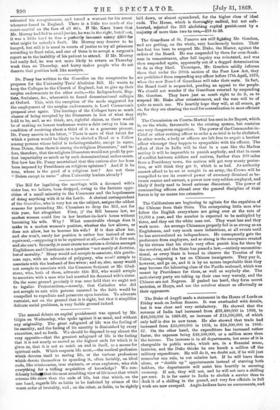The Bill for legalizing the marriage with a deceased wife's
sister has, we believe, been dropped, owing to the factious oppo- sition of a small minority in the Commons and the hopelessness of doing anything with it in the Lords. A clerical correspondent of the Guardian, who is very hot on the subject, assigns the oddest reasons for persuading Mr. Chambers to drop the Bill, not for this year, but altogether. First, if the Bill became law, no modest woman could live in her brother-in-law's house without becoming his wife. Why ? What conceivable change does it make in a modest woman's position, whether the law allows, or does not allow, her to become his wife ? If it does allow her, and she won't, surely her position is rather less instead of more equivocal,—supposing it to be equivocal at all,—than if it does not, and she can't. Secondly, it must create too serious a division amongst Englishmen and Churchmen on a question "not merely of doctrine, but of morality." Many would not scruple to associate, this gentle- man says, with an advocate of polygamy, who would scruple to associate with the husband of five wives ; and so, also, many would not scruple to associate with the Common Serjeant or Mr. Glad- stone, who, both of them, advocate this Bill, who would scruple to associate with a man who had married his deceased wife's sister. On the same ground precisely it was once held that we ought not to legalize Protestantism,—namely, that Catholics who did not scruple to mix with persons unsound in the faith would be compelled to repudiate and persecute open heretics. To advocate restraint, not on the ground that it is right, but that it simplifies delicate social problems, is very feeble ground indeed.






























 Previous page
Previous page